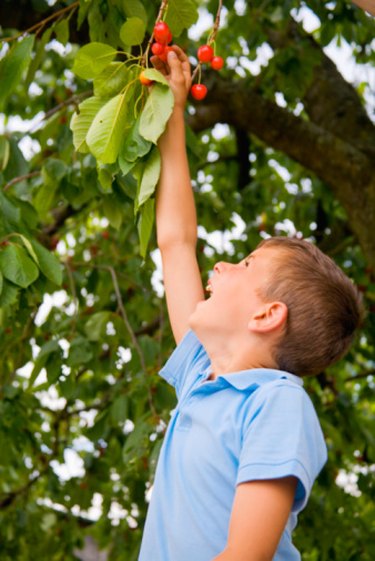
Cherry trees are hardy plants, but the presence of a serious pest or disease problem threatens the health and longevity of the trees, as well as their ability to produce blossoms in the spring and fruit in the fall. Pay close attention to the population of Japanese beetles on cherry trees to avoid serious health problems.
Japanese Beetles
Video of the Day
Japanese beetles are a type of beetle that affects cherry tree leaves and the overall health of the tree as a result. These small brown beetles have voracious appetites, and a large enough infestation can defoliate an entire cherry tree over a short period of time, leading to a leafless and unproductive, weak cherry tree. Japanese beetles feed on the flesh of the leaves between the veins, leading to a lacy leaf that dries out and falls from the tree.
Video of the Day
Effects
Japanese beetles leave cherry trees leafless, which stops the tree from producing new growth or fruit. Leaves are an essential part of a cherry tree's photosynthesis; a lack of leaves prevents the tree from processing nutrients. Additionally, Japanese beetles leave cherry trees more susceptible to diseases by weakening them through feeding. Although cherry trees will produce leaves the following growing season, damage from Japanese beetles affects the tree's growth. Controlling beetles on cherry trees is essential.
Physical Control
Physically removing Japanese beetles from cherry trees and killing them is one effective way to limit the damage the beetles do, although it is almost impossible to get every beetle by hand, and this method is not practical for larger trees. However, enticing the beetles away from the cherry tree is one simple method of physical removal. Pheromone traps help draw Japanese beetles off a cherry tree and into certain doom, preventing them from returning to the tree.
Chemical Control
Pesticides that contain cyfluthrin and bifenthrin help control Japanese beetle populations. Begin a preventive spray of pesticides in the early spring to control Japanese beetles at all stages of growth, as the grubs and larvae are just as damaging to cherry trees as the adult beetle. Regular applications of pesticides help lower Japanese beetle populations and stop other problem pests such as aphids or shot hole borers from attacking the cherry tree as well, leading to a healthier tree.
- University of Kentucky College of Agriculture; Japanese Beetles in the Urban Landscape; M.F. Potter, et al.; January 2010
- University of Minnesota Extension; Japanese Beetle Management in Minnesota; Vera Krischik, et al.; 2001
- Purdue Extension: Garden Tips: Japanese Beetles
- University of Illinois Extension; Beetle Damage; Greg Stack